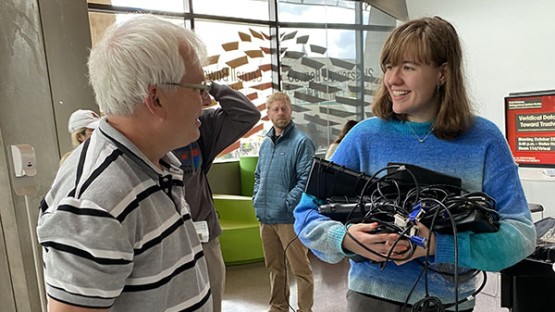
Volunteers saved 10 desktop computers, seven laptops, 14 monitors, countless cords and chargers, and one electronic cat toy from becoming e-waste at the first Technology Repair Fair, held in the lobby of Gates Hall on Oct. 13.
Dylan Van Bramer ’25, a computer science major, organized the fair with Steven Jackson, professor of information science and science and technology studies. They received support from the Cornell Ann S. Bowers College of Computing and Information Science, the Campus Sustainability Office, and the Cornell Computer Reuse Association (CCRA). The Technology Repair Fair helped visitors to repair, reuse, or recycle their old or damaged devices, while encouraging the Cornell Bowers CIS community to be more aware of the environmental impacts of computing and the benefits of designing repairable tech.
Each year, Cornell disposes about 100 tons of e-waste, but that number has remained stagnant for more than 10 years, said Ana Suppé ’23, an environmental science and sustainability major. Worldwide, we generated more than 59 million tons of e-waste in 2019 – an increase of 21% over five years, according to a 2020 report from the United Nations. These computers, tablets, phones, batteries, cords, and other devices require large amounts of resources, both to produce and dispose of correctly.
To reduce the amount of e-waste generated each year, a growing “right to repair” movement is encouraging people to fix their own devices and lobbying for laws that require manufacturers to make the repair process easier.
“Our goal was to keep devices in people’s hands and out of landfills as much as possible,” said Jackson. “A lot of the current design paradigms in computing in general, and consumer electronics, is really about keeping people locked out of their devices. This is partly a move against that – to get people more aware of the possibilities of repair – and to change the way people imagine and practice computing.”
Read the full story on the Cornell Bowers CIS website.
